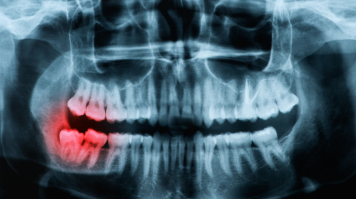Wisdom Teeth Removal
Wisdom teeth removal is a surgical procedure that involves the extraction of one or more wisdom teeth, which are the last set of molars that typically emerge in the late teenage years or early twenties. Wisdom teeth may cause problems if they don't have enough space to grow or if they grow in an improper position, which can lead to pain, infection, and other dental issues. As a result, many people may require wisdom teeth removal to maintain their oral health and prevent further complications.

There are several signs and symptoms that may indicate a need for wisdom teeth removal. Some common indicators include:
- Pain or discomfort in the back of the mouth, particularly around the wisdom teeth.
- Infection or inflammation of the gum tissue around the wisdom teeth.
- Difficulty opening the mouth or chewing due to pain or swelling.
- Crowding or shifting of adjacent teeth caused by the growth of wisdom teeth.
- Development of cavities or decay in the wisdom teeth due to difficulty cleaning them properly.
- Formation of cysts or tumors around the wisdom teeth.
If you experience any of these symptoms or the dentist or oral surgeon notices any issues during an exam or X-ray, they may recommend wisdom teeth removal as a solution to prevent further complications and maintain oral health. It's important to schedule regular dental check-ups and report any discomfort or changes in your oral health to your dentist.
If there's anything you'd like to know more about, just let us know - we're always happy to provide additional information
Fill the details will get back to you shortly...

Wisdom teeth are the last set of molars to emerge in the back of the mouth, usually between the ages of 17 and 25.
Wisdom teeth may need to be removed if they are causing pain, infection, gum disease, tooth decay, or if they are crowding or damaging other teeth. We can evaluate your condition and determine if removal is necessary.
The procedure itself is typically painless because you will be given local anesthesia or sedation to numb the area. After the procedure, you may experience some discomfort or swelling, but this can be managed with pain medications and ice packs.
Recovery time can vary depending on the extent of the surgery and your individual healing process. Most people can return to normal activities within a few days, but it may take up to two weeks for the area to fully heal.
It's important to follow a soft food diet for the first few days after the procedure and avoid hot, spicy, or hard foods that may irritate the area. Drinking plenty of fluids is recommended, but you should avoid using straws, as the suction can dislodge the blood clot and delay healing.
If you will be given sedation, you will need someone to drive you home after the procedure. It's also helpful to have someone with you for the first few hours after the appointment to assist with any needs you may have.
As with any surgical procedure, there are potential risks and complications, such as bleeding, infection, nerve damage, or dry socket. We will discuss the risks and benefits of the procedure with you and provide instructions for reducing the risk of complications.
Proper post-treatment care is crucial to ensure a speedy and smooth recovery after wisdom teeth removal. Here are some general guidelines to follow:
- Rest: Plan to take it easy for at least 24 hours after the procedure. Avoid physical activity, heavy lifting, and anything that could dislodge the blood clot from the extraction site.
- Ice packs: Apply ice packs to your cheeks for the first 24 hours to help reduce swelling and discomfort.
- Pain management: Take pain medications as prescribed.
- Oral hygiene: Brush your teeth gently and avoid the extraction site for the first few days. You may use a saltwater rinse to keep the area clean and promote healing.
- Diet: Stick to a soft food diet for the first few days after the procedure. Avoid hot, spicy, or hard foods that may irritate the extraction site. Drink plenty of fluids but avoid using straws, as the suction can dislodge the blood clot and delay healing.
- Follow-up appointments: Attend any follow-up appointments as scheduled to ensure proper healing and monitor for any complications.
It's important to follow these guidelines and any additional instructions provided by us to promote healing and reduce the risk of complications. If you experience excessive bleeding, severe pain, or signs of infection, contact your dentist immediately.

Working Hours
Monday - Saturday : 10:30 AM - 7:00 PM
Thursday: Holiday
Sunday: 10:30 AM - 1:00 PM
Call Us
+91 91081 24151
+91 99001 14151
Mail Us
happytohelp@vatsandparam.com